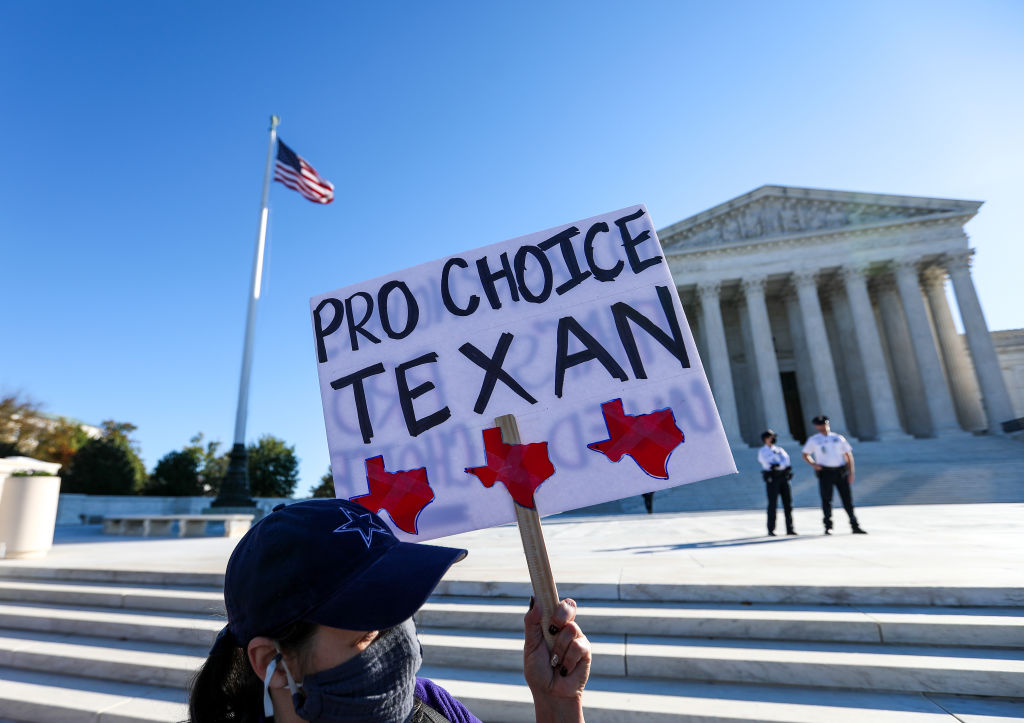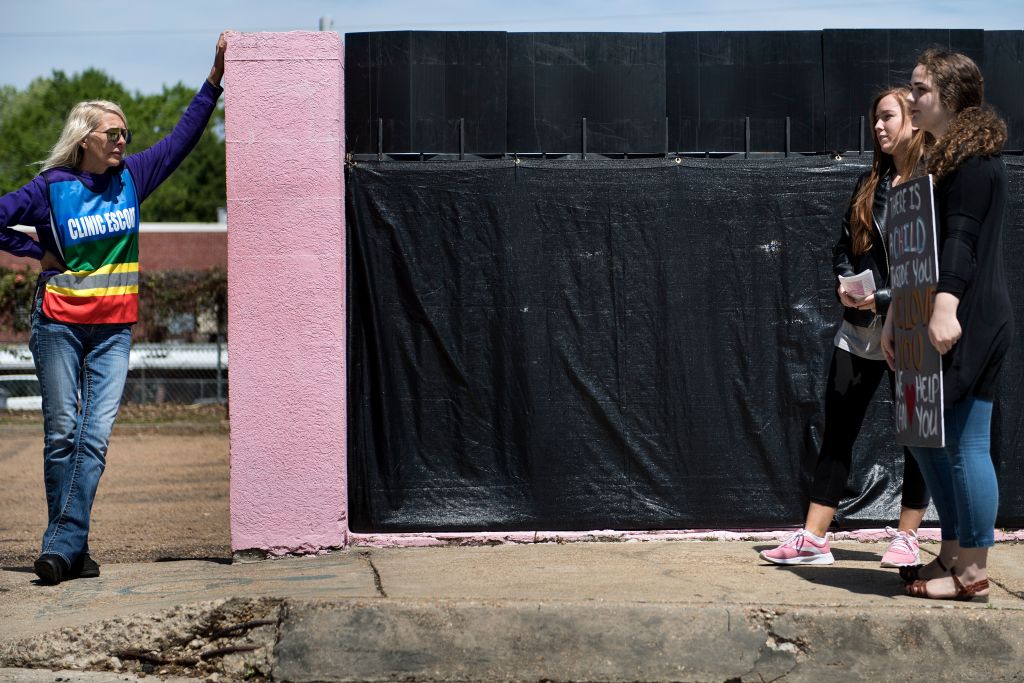As the nation focuses on abortion bans in Texas and Mississippi now before the U.S. Supreme Court, some advocates in the South are frustrated that their dire warnings — that abortion restrictions in the region would inevitably reverberate throughout the country — went unheard for so long.
Now those advocates argue that lack of action on laws such as Mississippi’s abortion ban has invited the most significant challenge to Roe v. Wade in history. Further, they say, if Mississippi is successful in defending its abortion ban, that decision will touch off a domino effect, starting in other Southern states and eventually spreading across the U.S, including places where abortion is currently accessible.
Even if the court leaves Roe v. Wade partially intact, access in major cities such as Atlanta, Birmingham and New Orleans — historically beacons of access in the South and located in states where out-of-state residents make up nearly one-in-five abortions — will be at new risk, as all three states face their own bans that are tethered to the fate of the more high-profile cases.
In the meantime, as justices mull arguments from Mississippi and Texas, advocates are busy clarifying falsehoods that abortion is now illegal, fighting stigma, and reducing barriers to care — with an eye to not only healthcare but also to the economic, social, gender, and racial implications that accompany reproductive rights.
“Our fight is not solely about abortion — it’s abortion and many other things. If we can’t meaningfully decide to not be pregnant, we can’t meaningfully decide to be pregnant or to become parents,” said Roula AbiSamra, state campaign manager for Amplify GA, a collaborative of reproductive rights and justice groups in Georgia. “And I continually come back to that positive vision of what we would have if this world and if this state were free — and it would not look like an abortion ban. It would not look like abortion for some of us but not for others.”
Mississippi is asking for Roe v. Wade to be reconsidered and overturned — but I don’t know if people understand this is a national-level machine.”
Roula AbiSamra, advocate in Georgia
Though laws do vary state by state, it’s hard not to see abortion rights across the Deep South as, in many ways, interlinked. The 2021 Texas law, which effectively bans abortions after six weeks of pregnancy, followed and largely built off of a 2019 Mississippi law that did the same thing. At the time, abortion access advocates in Mississippi warned the ban — then the strictest in the nation — would soon be duplicated by neighboring states, further thwarting access in the already patchwork region.
Outcomes in both the Mississippi and Texas cases will determine how other states, particularly those hostile to abortion access in the South and Midwest, legislate restrictions. But advocates also point to the reality that has long plagued this region and only gotten worse over the last decade. Conservative state legislatures’ near-constant and increasingly restrictive efforts to curb abortion access have created a landscape where Southerners’ ZIP codes and financial stability largely determine whether they can access abortion.
In Georgia, a federal appeals court recently deferred judgment on the state’s 2019 six-week abortion ban until the Supreme Court weighs in on Mississippi’s 15-week ban. When oral arguments begin in the Mississippi case Dec. 1, it will be the first time the high court hears a pre-viability ban since Roe v. Wade, carrying heavy implications for access in Georgia.
“The appeals court made explicit that what happens in the Mississippi case is relevant to what happens here,” AbiSamra said. “We know this, we have been saying this — Mississippi is asking for Roe v. Wade to be reconsidered and overturned — but I don’t know if people understand this is a national-level machine.”
‘Screaming from the rooftops’

Advocates in the South have been sounding the alarm for some time, but not everyone has heard it — until now. “Folks on the ground, especially reproductive justice activists, have been kind of screaming from the rooftops for a while now,” said Quita Tinsley Peterson, who co-directs Access Reproductive Care-Southeast, the only abortion fund serving Georgia.
Peterson said the bans in Southern states explicitly target marginalized people: “It’s clearly a coordinated strategy by folks who are not only anti-abortion, but anti-their own enemies, which often look like Black and brown people, queer and trans folks, and those in rural areas.”
Access has never been robust here, but restrictions have compounded and dovetailed to unprecedented levels that risk turning the whole region into an access desert where the closest clinic is hundreds of miles away — already the reality for most in Mississippi and Texas.
Soon after the Texas ban went into effect, research showed the distance to a clinic for most Texans increased from about 35 miles to nearly 500 miles round-trip, according to data from Guttmacher Institute. And the two states closest to most Texans, Louisiana and Oklahoma, have their own restrictions that require multiple-day trips, unfeasible for those who can’t afford to travel, take time off work or find childcare — disproportionately women of color living in poverty, especially in rural areas.
By early November — two months after the ban took effect and just as the Supreme Court was hearing expedited procedural arguments — further research showed the ban was having its intended effect. Abortion access in Texas dropped by half, and subsequent wait times in neighboring states ballooned, compounding negative impacts across the region.
It took a while for supporters of reproductive rights to wake up to what was happening to access across the South, said Dr. Bhavik Kumar, a family medicine physician who provides abortion services at a Houston Planned Parenthood clinic. “What happens in Texas doesn’t stay in Texas. Other states are copying these laws — this is a pattern for access across the South, as well as in the Midwest and these restrictive states,” he said. “It just didn’t feel like folks were grasping it or perhaps even folks within the movement, honestly.”
“It’s not lost on us that people in coastal cities and people in D.C. are like, ‘Oh my gosh, there’s an issue!’, when we’ve been screaming for a long time.”
Quita Tinsley Peterson, Co-Director of Access Reproductive Care-Southeast
Kumar also points to other countries, like the recent death of a pregnant woman in Poland, to foreshadow what he fears is a not-so-distant southern abortion landscape. “We don’t need to wait to see what happens with the Mississippi case and when abortion is slaughtered throughout the South and the Midwest and we don’t have access. It’s already happening in other countries,” said Kumar, who also serves on the board of Physicians for Reproductive Health and recently began practicing in Louisiana in the wake of Texas’s ban.
Though the Georgia six-week ban was immediately blocked in federal courts and technically never took effect, advocates feel its chilling effect on access. AbiSamra says Amplify GA’s coalition partners have battled misinformation and confusion for months, fielding calls from pregnant people wondering if abortion is still legal in Georgia.
Advocates across the sprawling region all separately pointed to the importance of local elections and community mutual aid, like abortion funds. AbiSamra noted that statehouses are the first line of defense against restrictions. In Georgia, every seat of the state legislature goes up for a vote every two years. “So as constituents we’d better start asking what elected officials need to do to earn our trust in 2022,” she said.
She also points to national protections, such as the Women’s Health Protection Act passed by Congress in September that would codify a legal right to choose abortion and make it harder for states to enact bans.
Meanwhile, in Louisiana, just last year abortion advocates saw a narrow win when the Supreme Court overturned an admitting privileges law that threatened to close all but one clinic across the state. But now advocates feel whiplashed as the state’s 15-week ban, which is tethered to Mississippi’s, is back in front of the court.
“Louisiana is literally the middle child between what’s happening in Texas and Mississippi right now,” said Michelle Erenberg, executive director of Lift Louisiana, an New Orleans-based advocacy organization that works on women’s health policy. “I think a lot of the national coverage rightly has focused on the devastating impacts of the current law in Texas and also the case in Mississippi that is on the horizon. But both of those stories have a dramatic impact on Louisiana.” Erenberg also pointed out that just last year, voters passed a state constitutional amendment banning abortion if Roe v. Wade is overturned.
And in Alabama, the state legislature passed a near-total abortion ban in 2019, but it never took effect after being quickly blocked by a federal judge. State officials declined to appeal noting lack of precedent, but said their ultimate objective was to move it, or similar cases, to the Supreme Court — as now is the reality.
What’s to come
The Mississippi 15-week ban is limited to one legal question: whether all pre-viability bans on elective abortions are unconstitutional. If the Court agrees with Mississippi that states can ban abortion before about 24 weeks — which, until the Texas six-week ban, no state had successfully upheld in federal court — states will have free rein to pass stricter and stricter bans.
If the Court weakens Roe, but upholds other precedents like Planned Parenthood v. Casey and Whole Woman’s Health v. Hellerstedt that use the “undue burden” standard to gauge abortion restrictions, conservative states with patchwork laws are likely to continue challenging the standard and winding concurrent bans through federal courts, similar to the current landscape.
If the Supreme Court overturns Roe v. Wade, at least 18 states are expected to immediately ban abortion. That would mean an entire swath of the country without abortion access — stretching from Texas across the Southeast up to Missouri, with North Carolina likely the only Southern state to not immediately ban or severely limit access. It’s a reality abortion advocates in the South have been facing one way or another for years.
“Access is not just being thwarted or impeded in Texas because of what’s happening there now, or Mississippi. There’s a whole region of the country that is and has been struggling to secure and protect abortion access over the last two decades or more,” said Erenberg of Lift Louisiana.
Peterson, in Georgia, said supporters of reproductive choice in other parts of the country have been ignoring Southern advocates for years: “It’s not lost on us that people in coastal cities and people in D.C. are like, ‘Oh my gosh, there’s an issue!’, when we’ve been screaming for a long time.”



